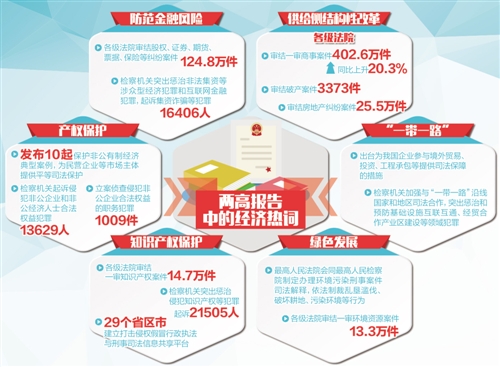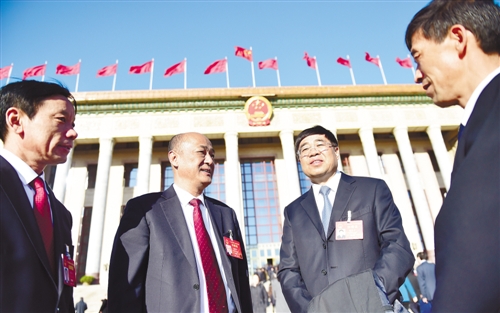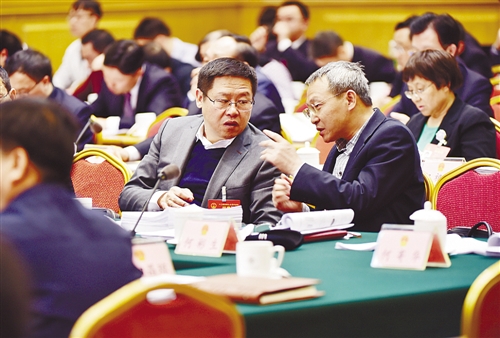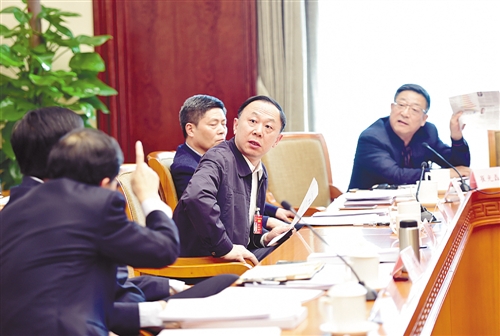

On the morning of March 12th, the Fifth Session of the 12th National People’s Congress held its third plenary meeting in the Great Hall of the People to hear and consider the work reports of the two universities. Nie Ruiping (second from left), deputy to the National People’s Congress, said in an exchange with Zhang Lingping (third from left), that the level of rule of law in China’s market economy was greatly improved last year, which released a huge institutional dividend. Photo by our reporter Li Jinglu

On the afternoon of March 12, the Hunan delegation of the National People’s Congress deliberated the report of the two high schools in the resident. Wu Xiangdong (first from left) and Wu Jinshui exchanged views on actively promoting the construction of a safe China. Photo by our reporter Li Jinglu

On March 13th, the Hubei delegation of the National People’s Congress deliberated the report of the two high schools in the resident sub-group. Deputy Xie Yuka (middle) said in his speech: "Law enforcement for the people is to strive to make the people feel fair and just in every judicial case." Photo by our reporter Li Jinglu
Punish campus violence, crack down on "village tyrants", severely punish illegal fund-raising, and dispose of "zombie enterprises" according to law … …
In the past few days, these highlights in the reports of the two high-level committees have become topics for deliberation and discussion by deputies. The deputies believe that the Supreme Law and the Supreme People’s Procuratorate perform their duties and responsibilities around the steady and healthy development of the economy, serve the people’s livelihood, make the judiciary more open and transparent, and the people’s sense of fairness and justice is getting stronger and stronger.
Carry out the new development concept
"After listening to the Supreme People’s Court’s work report, I feel that the Supreme Law in 2016 has done a lot of work in resolving excess capacity, reflecting the real progress made by the rule of law in deepening reform and promoting the work of de-capacity, and handling enterprises’ ‘ Life and death ’ Get on the right track. " Wang Ji, member of Chinese People’s Political Consultative Conference and former chairman of China Dongfang Electric Group Co., Ltd., said in an interview with the reporter of Economic Daily.
In 2016, the national courts concluded 3,373 cases of corporate bankruptcy, a year-on-year increase. In February this year, according to the official statistics of the Supreme Court, in 2016, the national courts accepted 5,665 bankruptcy cases, up 53.8% year-on-year.
"Some enterprises neither operate nor cancel, but have been stagnant or shelved for a long time for various reasons, which is called ‘ Vegetable enterprise ’ 。” Commissioner Wang Ji said that these enterprises not only waste market resources, but also their potential disputes and lawsuits may occupy a lot of judicial resources. In addition, it will also interfere with national institutions in data statistics, which is not conducive to the formulation of national policies and the effective development of social management. These "vegetable enterprises" should be eliminated according to law to purify market space.
At present, various financial innovations emerge one after another, and risk prevention is increasingly urgent. Under the guise of online loan fraud, raising funds under the banner of innovation, taking high returns as bait, and constantly changing the "coat" of illegal fund-raising has trapped many people.
The deputies said that the procuratorial organs actively participated in the special rectification of Internet financial risks and severely punished stakeholder-related economic crimes such as illegal fund-raising, as well as money laundering, underground money houses and online pyramid schemes. This makes the people’s money bags better protected.
"Fraudulent poverty alleviation funds", "Accurate poverty alleviation to identify good relatives and friends" and "Profit from reselling poverty alleviation goods" … … Last year, courts at all levels concluded 15,000 cases related to corruption and misappropriation of poverty alleviation funds, and procuratorial organs at all levels investigated and dealt with 1,892 job-related crimes in poverty alleviation.
"This year, the highest inspection proposed to ‘ Continue to focus on punishing and preventing duty crimes in the field of poverty alleviation ’ , and jointly with the National Development and Reform Commission and the Poverty Alleviation Office ‘ Thirteenth Five-Year Plan ’ The key projects of ex situ poverty alleviation and relocation will carry out preventive supervision and implement listing supervision, so that the rights and interests of poor people will be more firmly guaranteed. " Liang Mingyuan, deputy to the National People’s Congress and president of Gansu Higher People’s Court, said.
Promote the legalization of property rights protection
"In 2016, the courts and procuratorates adhered to justice for the people and did a lot of fruitful work in safeguarding the legitimate rights and interests of enterprises and maintaining market order." Wang Wei, deputy to the National People’s Congress and chairman of Guizhou Langma Information Technology Co., Ltd., talked about his personal experience.
Deputy Wang Wei said that his company had suffered a cyber attack that paralyzed its website, and the suspects also extorted money through online communication tools. After the incident, the company reported the case to the public security organ in time, and with the support of the procuratorial organ, the suspect was quickly locked and arrested, effectively ensuring the normal operation of the enterprise.
In terms of judicial policy system, the Supreme Court has specially issued opinions on strengthening judicial protection of property rights, guiding courts at all levels to punish crimes of infringing property rights according to law. The Supreme People’s Procuratorate formulated and implemented "18 opinions" on safeguarding and promoting the development of the non-public economy and "22 opinions" on strengthening the judicial protection of property rights, prosecuted 13,629 people for crimes against the legitimate rights and interests of non-public enterprises and non-public economic persons, and filed 1,009 cases of duty crimes against the legitimate rights and interests of non-public enterprises.
Deputies believe that the two high schools strictly distinguish between illegal income and legal property, personal property and corporate property, economic disputes and economic crimes. Strictly following the principles of non-retroactivity, being lenient with the old and properly handling historical property rights cases in accordance with the law are conducive to inspiring people to innovate, start businesses and create wealth.
Declaring war "difficult to implement" and punishing "Lao Lai" is one of the highlights in the Supreme Law Report. To solve the difficulty of enforcement, it is necessary to ensure that the legitimate property rights and interests can be realized according to law, and let the phenomenon of "winning the lawsuit and losing money" become history. "What impressed me in the report was the breakthrough in solving the implementation difficulties." Zhang Liyong, deputy to the National People’s Congress and president of the Higher People’s Court of Henan Province, said that last year, the national courts earnestly implemented the solemn promise of "basically solving the implementation difficulties in two to three years", and made great achievements by working with one heart and one mind to overcome difficulties.
Taking the Henan court as an example, the representative of Zhang Liyong said that they have successively carried out special operations such as "Midnight Action", "Early Morning Attack", "Mid-Autumn Thunder", "Magic Soldiers on New Year’s Eve" and "Battle of the First Day". Deputy Zhang Liyong said: "In our work, we have put 417,000 ‘ Lao Lai ’ Blacklisted and sentenced to 1380 ‘ Lao Lai ’ Punishment, more than 260,000 cases were executed, and the execution rate was 77.8%, making judicial judgment truly a sword to punish illegal and untrustworthy. "
Promote mass entrepreneurship and innovation
"The two high reports show the support and protection of the judicial organs for enterprise innovation." Lu Jinsheng, deputy to the National People’s Congress and general manager of Zhejiang Taizhou Yongqiang Electroplating Company, said that the design of ceramics is the most easily imitated. "At present, the punishment for infringing intellectual property rights is low, and the cost of infringing intellectual property rights should be further increased."
Statistics show that in 2016, courts at all levels in China concluded 147,000 first-instance intellectual property cases. Last year, the Supreme Law also formulated judicial interpretations such as the trial of patent disputes, and improved the rules for the protection of intellectual property rights. The Supreme People’s Court has tried a series of "Jordan" trademark disputes according to law, which shows China’s position and determination to strengthen intellectual property protection. In addition, intellectual property courts in Beijing, Shanghai and Guangzhou have explored the application of punitive damages, focusing on solving the problems of low infringement cost and high cost of safeguarding rights. Intellectual property courts have been set up in Nanjing, Suzhou, Wuhan and Chengdu to centrally administer intellectual property cases across regions.
Under the upsurge of mass entrepreneurship and innovation, innovative and high-tech enterprises will have more room for development.
"We are engaged in the deep processing industry of agricultural products, and we need to invest more manpower and material resources in product innovation. The agricultural product processing industry is relatively transparent, the technology is updated quickly, and the number of patent applications is also increasing year by year. " Shi Kerong, deputy to the National People’s Congress and chairman of Sanhe Huifu Cereals and Oils Group Co., Ltd., said that the punishment for infringement of intellectual property rights should be strengthened at the legal level, and the road of scientific and technological innovation of enterprises can go further.
"In the past, most cases involving scientific and technological innovation adopted a one-size-fits-all approach, and the legitimate rights and interests of scientific and technological personnel were not effectively safeguarded, which bound the hands and feet of scientific researchers, resulting in their low enthusiasm and lack of initiative." Xie Quan, deputy to the National People’s Congress and dean of the College of Big Data and Information Engineering of Guizhou University, said that the "15 Opinions" formulated by the Supreme People’s Procuratorate for ensuring scientific and technological innovation proposed that the "five boundaries" such as legal part-time income of scientific researchers and bribery, intellectual property income and corruption and bribery should be accurately grasped, which was a good measure to help scientific and technological innovation, created a good legal environment for scientific and technological innovation, and inspired the confidence of scientific and technological workers in continuous innovation.